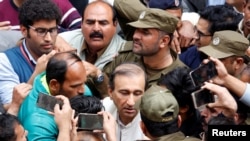One of Pakistan’s biggest media tycoons has been in custody for two months in a case involving alleged corruption in a 34-year-old land deal. A day after his arrest in early March, his television news channel, Geo News, was moved from its usual place among the first 10 channels in the cable line-up to higher numbers, a common tactic in Pakistan to make a channel hard to find. It was restored after a court order.
A government spokesperson at the time, Firdous Ashiq Awan, said the detention of Mir Shakil-ur-Rahman, the owner and editor-in-chief of Geo television news channel and the Jang group of newspapers, had nothing to do with their news coverage, but national and international rights groups disagreed.
The Committee to Protect Journalists called it an “obviously drummed-up case.” Amnesty International called it “yet another incident of harassment of journalists in Pakistan.” Reporters Without Borders (RSF) said Pakistani authorities were “displaying appalling creativity in their attempts to intimidate journalists.” And Human Rights Watch called it “just the latest case of harassment against Pakistan’s beleaguered media.”
Inside Pakistan, journalist groups, human rights activists, and leading opposition politicians alike condemned the move as another effort to muzzle the media.
The government agency responsible for the arrest, the National Accountability Bureau, denies the accusations and claims the case is being dealt with on merit. A NAB official, talking to VOA on the condition of anonymity because he was not authorized to speak to media, said the arrest was aimed at supporting the investigation.
“These are very influential people. They can tamper with evidence or with witnesses. It is very important to keep them away, especially from the witnesses, while we are investigating,” he said.
Rahman’s lead council disagrees. The case dated back 34 years and all the records were public and already in the NAB’s possession, Muhammad Amjad Pervaiz said, calling the arrest malafide.
“In my 20 years’ experience, this is the only case in which both authorization of inquiry and issuance of warrant of arrest was given on the same day,” he said.
Imran Aslam, the president of Geo television, pointed out that Rahman was arrested at a time when he was going out of his way to cooperate with the investigation.
“MSR (Rahman) lives in Dubai and is not a Pakistani tax resident for years. Yet, he came specifically for the NAB investigation,” Aslam said.
Media companies and individual journalists in Pakistan have long faced pressures from state and non-state actors alike. Over the years, many of them have suffered harassment, kidnappings, torture, even death, for doing their job. The situation seems to have worsened in recent years, causing the country to drop by three spaces to 145th in the RSF 2020 World Press Freedom Index.
Two of VOA’s local language websites that cater to the Urdu and Pashto speaking population of Pakistan have been blocked in the country for more than a year. Fawad Chaudhry, who was information minister when the sites were blocked but has since moved to another post, claimed the sites were blocked for "false and prejudiced reporting."
An intelligence source told VOA on condition of anonymity that the decision to block the Urdu website was triggered by VOA's coverage of the Pashtun Tahaffuz Movement, an ethnic rights group based in areas bordering Afghanistan, which accuses Pakistan's military of human rights violations. PTM activities, including its rallies attended by thousands, are conspicuously absent from Pakistani media’s news coverage.
Prime Minister Imran Khan has repeatedly said that Pakistan’s media is freer than media in many western nations. Senior ministers in his government often point toward the lively discussions, often critical of the government, on daily talk shows on dozens of channels.
Meanwhile, journalists complain that pressure coming from authorities, either from the government or from the country’s powerful military and its intelligence agencies, has led to excessive self-censorship.
A 2018 survey conducted by Pakistani rights group Media Matters for Democracy, found that 88% of journalists in Pakistan self-censor in professional and 79% in personal settings.
In many instances, the self-censorship has been institutionalized. Most of the current affairs talk shows that used to be broadcast live are now prerecorded.
“That is to control what goes on air. In most channels they have preview committees that self-censor anything that they think might get an objection,” a senior management official from a news channel told VOA on the condition that neither his nor his channel’s name could be published. Among the several topics that were off limits, he said, the top two were any criticism of the judiciary or the military.
Asma Shirazi, a prime time talk show host, testifies to this. She has faced repeated harassment online and offline. When asked if Pakistan’s media was free to report whatever it deemed necessary, her response was simple.
“Of course not,” she said.
Pakistan’s recently appointed information minister, Shibli Faraz, did not respond to multiple requests for a comment.
Media Mogul's Detention in Pakistan Raises Press Freedom Concerns




